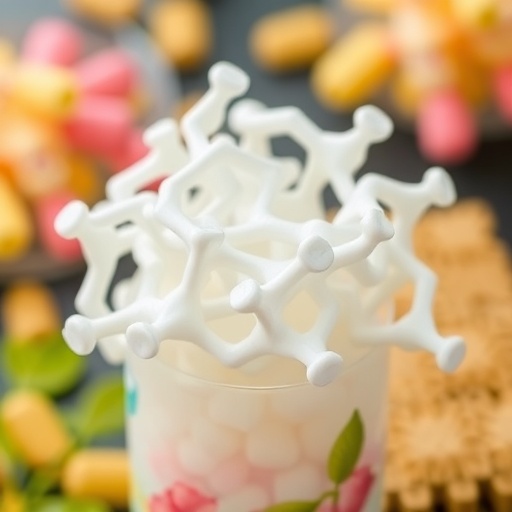In a groundbreaking advancement poised to reshape the plastics industry, researchers in the Republic of Korea have engineered a fully integrated microbial platform capable of synthesizing long-chain polyesters exclusively from renewable plant oils. This pioneering innovation circumvents traditional reliance on fossil fuels, offering a sustainable, eco-friendly alternative in polymer production without compromising material quality or scalability.
The heart of this breakthrough lies in a meticulous two-step bioconversion process leveraging genetically tailored microorganisms. Initially, an engineered strain of Candida tropicalis yeast catalyzes the oxidation of n-alkanes derived from plant oils, converting them efficiently into 1,12-dodecanedioic acid (1,12-diacid). The process exhibits exceptional performance metrics, achieving titers as high as 150 g/L and productivity rates of 1.53 g per liter per hour in a controlled 5-liter bioreactor setup. Remarkably, these parameters were successfully scaled up to a 50-liter pilot fermenter, demonstrating the platform’s industrial viability.
Transitioning from diacid intermediates, the next phase involves a custom-engineered Escherichia coli expressing critical enzymes—carboxylic acid reductase and phosphopantetheinyl transferase. This microbial chassis adeptly converts 1,12-dodecanedioic acid into 1,12-dodecanediol (1,12-diol) with unparalleled efficiency, reaching concentrations of 68 g/L and productivity near 1.42 g/(L·h). These yields set new benchmarks for microbial synthesis of long-chain diols, surmounting challenges traditionally posed by substrate toxicity and metabolic bottlenecks.
Purification of these bio-derived monomers is accomplished with remarkable precision, recovering over 98% of the product, essential for subsequent polymer synthesis. The monomers then undergo solvent-free polycondensation, culminating in the generation of high-performance polyester polymers. Comprehensive analytical techniques—including nuclear magnetic resonance (NMR), differential scanning calorimetry (DSC), and Fourier-transform infrared spectroscopy (FTIR)—affirmed the polymers’ molecular architecture and thermal characteristics closely mirror those of petrochemical analogues, confirming their suitability for industrial applications.
Crucially, radiocarbon isotope assays substantiated that the entire polymeric material originates from renewable biological carbon, underscoring the process’s authenticity as a circular bioeconomy model. This contrasts starkly with conventional plastics, which embed fossil carbon, exacerbating environmental challenges.
The research team undertook preliminary techno-economic evaluations, highlighting that bio-based polyester production could rival petrochemical processes cost-wise. This becomes particularly compelling when leveraging non-food lipid feedstocks such as waste cooking oil or algal-derived oils, opening pathways for valorizing otherwise discarded biomass and mitigating competition with food resources.
Beyond laboratory scale experiments, the platform underscores seamless integration from microbial fermentation to downstream purification and polymerization. This holistic workflow not only attests to scalability but also aligns harmoniously with sustainability objectives by minimizing solvent usage and reducing overall environmental footprint.
This innovation occupies a pivotal niche at the intersection of synthetic biology, metabolic engineering, and polymer science, exemplifying how rational design principles can deliver transformative advances in material science. The convergence of precise genetic manipulation and bioprocess engineering here yields a microbial assembly line capable of producing renewable monomers with unparalleled efficiency, thus disrupting entrenched petrochemical paradigms.
As global markets intensify their demand for biodegradable, renewable, and carbon-neutral materials, this microbial platform offers a tangible vault into sustainable manufacturing of plastics without fossil fuel dependency. Its potential ripple effects extend to reducing microplastic pollution, alleviating greenhouse gas emissions, and fostering circular material economies across diverse sectors ranging from packaging to automotive components.
Perhaps more profoundly, this work heralds a paradigm shift in how raw materials are procured and transformed. By harnessing microbial metabolism to directly convert renewable lipids into complex polymeric building blocks, it surpasses traditional biomass processing constraints and charts a direct route from feedstock to functional material, circumventing multiple intermediate steps typically required.
Future research efforts will likely focus on expanding substrate versatility, enhancing enzyme turnover rates, and optimizing fermentation conditions to further augment productivity and reduce costs. Additionally, exploring the biodegradability profile and life-cycle assessments of the resultant polyesters will be essential to fully validate their environmental benefits.
In essence, this pioneering study illuminates a new frontier in biopolymer synthesis, merging sustainability with cutting-edge biotechnology. It exemplifies how deliberate engineering of microbial systems can translate renewable resources into high-value, performant materials, potentially displacing petroleum-based plastics on a global scale.
The profound implications of these findings resonate deeply with ongoing global drives to confront plastic pollution and climate change. By democratizing access to bio-based polymers that do not sacrifice quality or scalability, this microbial platform marks a decisive stride toward a more sustainable and circular plastics economy.
Subject of Research: Not applicable
Article Title: An End-to-End Microbial Platform for 100% Bio-Based Long-Chain Polyester: From Renewable Substrate to Eco-friendly Polymer
News Publication Date: 1-Oct-2025
Web References:
https://www.sciencedirect.com/journal/journal-of-bioresources-and-bioproducts
http://dx.doi.org/10.1016/j.jobab.2025.09.005
References:
DOI: 10.1016/j.jobab.2025.09.005
Image Credits: Biotechnology Process Engineering Center, Cheongju-si 28116, Republic of Korea
Keywords
Biomass, Organic matter, Nanomaterials, Research methods, Chemistry, Plastics, Polymer engineering, Materials processing, Biomaterials, Technology




